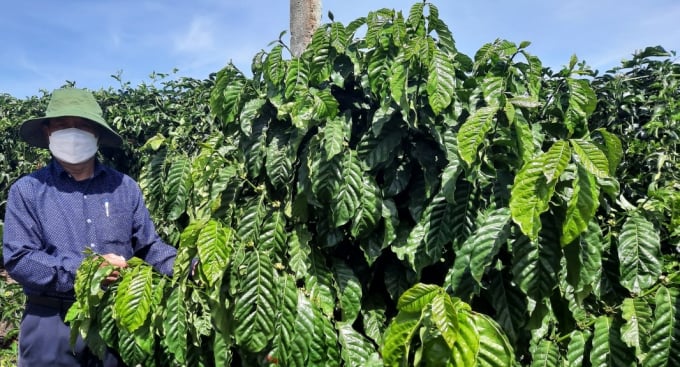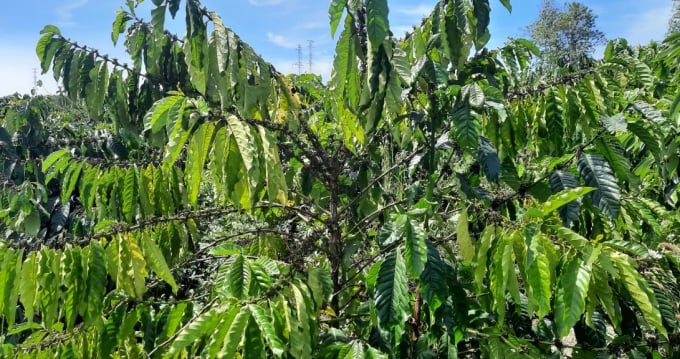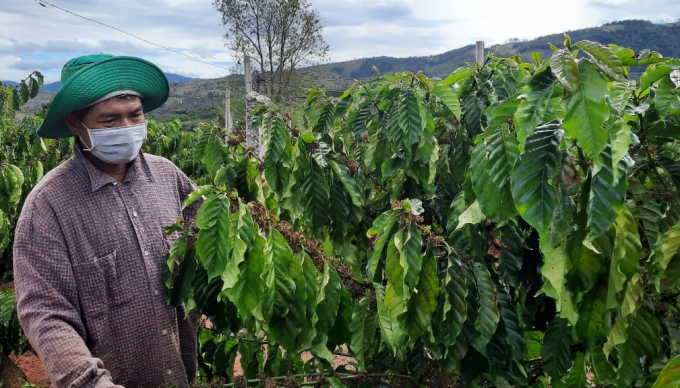May 20, 2025 | 11:09 GMT +7
May 20, 2025 | 11:09 GMT +7
Hotline: 0913.378.918
May 20, 2025 | 11:09 GMT +7
Hotline: 0913.378.918
Over the past years, the Central Highlands provinces have called for farmers and enterprises to replant coffee trees to gradually replace the area of old coffee trees which suffer from pests and have low productivity. With the support of the VnSAT Project, after five years, the coffee replanting proved economic efficiency.

The re-cultivated coffee garden of Chuyen's family now has impressively high productivity. Photo: Tuan Anh.
Arriving at the coffee capital in Dak Ha district (Kon Tum province), we heard about Hoang Danh Chuyen (village 1, Ha Mon commune), who is known as the "coffee king" of the North West region.
With a full smile, Chuyen said that he has re-planted almost 15 ha of coffee from his family thanks to the support of the VnSAT Project.
Chuyen's coffee garden has been replanted for four years, so far the yield is about 4.5 tons of kernels/ha.
In 2021, the VnSAT Gia Lai project and its technical support unit conducted 20 training courses on sustainable coffee replanting techniques as planned.
Until now, 5,385 farmers have been trained with a total coffee replanting area of 5,649 ha.
The story of coffee replanting started in 2016 when Chuyen realized that the coffee garden was not only old and low-yielding, but the planting techniques of previous years were no longer suitable.
“In the past, I bought the coffee garden and then renovate it. At that time, coffee was grown by people on rocky hills, the seed quality was not good, leading to very low yield," said Chuyen.
After receiving support from the VnSAT Project, Chuyen decided to carry out comprehensive replanting of his family's coffee garden. He demolished all the old coffee trees, leveled the hills, and then replanted under the guidance of the VnSAT Project.
The VnSAT project also supported seedlings and fertilizers to help Chuyen feel more secure.
So far, Chuyen is very satisfied with the two varieties TR4 and TR9 he used for the replanted coffee garden.

Thanks to the VnSAT project, the coffee replanting movement is expanding in the Central Highlands. Photo: Dang Lam.
It was not easy to decide to destroy all the old coffee gardens and replant the whole garden
“If you keep the old coffee garden, the yield is only about 2.2 tons of kernels/ha, minus the cost, there is no profit,” Chuyen said.
Deciding to replant, he accepted to invest on average VND100 million for re-planting a hectare of coffee from the time of replanting until the time of harvest.
Chuyen said that although the investment cost for replanting was large, the first year was the most difficult time as they needed to prepare the soil and buy seedlings. In the following years, the investment cost is only about VND20 million/ha/year.
"The initial investment cost is large, but in return, replanting coffee with new varieties will quickly harvest. Only 3 years later we will be profitable. About 7 years later, we will get back investment", Chuyen shared.
Not only in Kon Tum, in recent years, the coffee replanting movement is spreading throughout the Central Highlands provinces. Everywhere you go, you will find re-cultivated coffee gardens full of vitality.
In village 5, Dak Krong commune, Dak Doa district, Gia Lai province, Bui Thanh Son and his wife are diligently taking care of their 4-year-old replanted coffee garden. Currently, Son's family has replanted 2.5 hectares of the total 3.5 hectares of coffee growing area.
Son said that before replanting, the family's coffee garden was planted in 1999, so it was old, the yield was only about 2 tons of kernels/ha/year.
In 2018, after receiving training support from the VnSAT project, Son's family decided to replant and use TR4 coffee. Pointing to the replanted coffee garden, Son said that the coffee garden is growing well, yielding about 4 tons of kernels/ha.
Dak Krong commune in Dak Doa district, Gia Lai Province is a locality with a large coffee growing area with more than 1,500 hectares. In 2021 alone, this locality has replanted 19 hectares and planted 36 hectares of new coffee. In the coming time, the Dak Krong commune is expected to re-cultivate about 17 hectares of coffee.
Assessing the effectiveness of coffee replanting, Ha Van Kien, Vice Chairman of Dak Krong Commune People's Committee, said that compared to the coffee garden planted more than 20 years ago, the later replanted coffee garden had much higher quality and productivity.

Thanks to timely loans from the VnSAT project, Bui Thanh Son's family bravely demolished the old coffee garden to replant. Photo: Tuan Anh.
Kien said that the demand for coffee replanting in the region was still very large, but people were still hesitant to re-cultivate because the prices of materials went up.
The cost of fertilizers, petrol and labor all increased, while coffee replanting takes at least three years to harvest. If replanting is carried out, many people also consider the option of intercropping with short-term trees to have a source of income to re-cultivate coffee trees.
Referring to the difficulties in coffee replanting, Son said that it was not easy for people to invest in replanting without support from the Government.
Son said that it took people three years to re-plant old coffee trees. So during the period, they would not have any income to cover their family's life. At this stage, people need funds for hoeing, weeding, fertilizing, buying seeds and nursing. The work costs hundreds of millions of dong for each ha.
"We want the government as well as the VnSAT project to support through many forms, for examples supplying fertilizers, seedlings ... to reduce investment costs for the people." Son shared.

The most difficult thing in coffee replanting is the source of capital to maintain the production of coffee that has not yet been harvested. Photo: Dang Lam.
Trinh Khac Duong, Director of Dak Krong Agriculture and Service Cooperative said that coffee was still the main business in the locality. Currently, about 300 ha of coffee area in the commune needs replanting.
Therefore, for a sustainable coffee industry, it is necessary to invest methodically right from the beginning, from the stage of soil preparation to the selection of seedlings. To do so, the Government must support from the training stage to the investment in seedlings and fertilizers to reduce financial pressure on people when investing in replanting.
Kien said, in addition to replanting techniques, the government or the VnSAT project should support investment in equipment and machinery to replace human power, thereby improving productivity and coffee quality.
In addition, in the first one or two of the re-cultivation, the Government should also provide financial support for coffee farmers.
Le Quoc Tuan, Deputy Director of the VnSAT Project Management Board in Gia Lai province, said that, in general, the implementation of coffee replanting has met the requirements planned by the Ministry of Agriculture and Rural Development. Specifically, the area of coffee re-cultivation has been replicated across localities across the province. The old coffee gardens with low productivity have been gradually replaced by replanted coffee gardens with high yields.
Translated by Hien Anh

(VAN) For years, the CRISPR-Cas9 genome technology has been reshaping genetic engineering, a precision tool to transform everything from agriculture to medicine.

(VAN) Vietnam aims to become a 'leader' in the region in the capacity and managing effectively soil health and crop nutrition.
![Reducing emissions from rice fields: [Part 1] Farming clean rice together](https://t.ex-cdn.com/nongnghiepmoitruong.vn/608w/files/news/2025/05/05/z6509661417740_a647202949c539012a959e841c03e1d3-nongnghiep-143611.jpg)
(VAN) Growing clean rice helps reduce environmental pollution while increasing income, allowing farmers to feel secure in production and remain committed to their fields for the long term.
/2025/05/19/5136-1-144800_230.jpg)
(VAN) The Nghe An Provincial People's Committee has just approved the list of beneficiaries eligible for revenue from the Emission Reductions Payment Agreement (ERPA) in the North Central region for the year 2025.

(VAN) 14 out of 35 domesticated elephants in Dak Lak province have had their living conditions improved, with 11 of them currently participating in the non-riding elephant tourism model.

(VAN) Muong Nhe Nature Reserve hopes that being upgraded to a national park will lay the foundation for forest protection efforts to be carried out in a systematic, modern, and sustainable manner.
/2025/05/16/3923-2-171845_52.jpg)
(VAN) Lower costs, higher yields, and improved soil quality are outstanding benefits that soybeans bring when integrated into the crop rotation system.